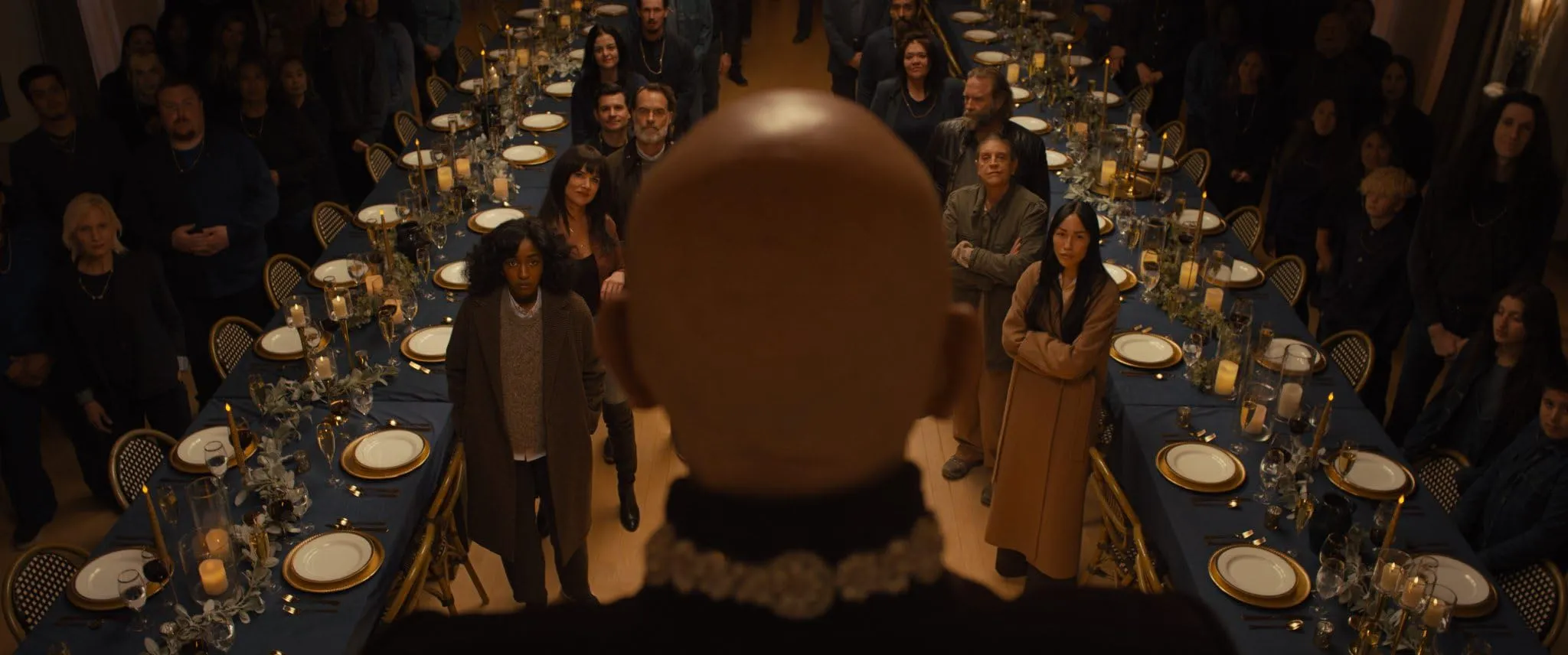In a world suspended between absurdity and darkness, “Opus” explores the journey of Ariel Ecton, a determined writer invited to the lavish and ominous residence of pop icon Alfred Moretti. Moretti—blending the theatrical flair of a rock legend with an enigmatic persona—summons Ariel for more than a standard interview, hinting at concealed narratives surrounding his anticipated comeback.
Ariel enters a mesmerizing yet treacherous environment where initial curiosity quickly transforms into unease. The group of guests—including a pompous magazine executive and a desperate photographer—symbolize society’s fascination with glamorous facades. Their fervent desire to orbit Moretti’s charisma masks deeper, more menacing intentions.
Each interaction reveals layers of manipulation, echoing historical examples of charismatic figures who exploit human vulnerability. Ariel’s growing discomfort uncovers the uncomfortable reality of how audiences worship celebrity personas, presenting a sharp critique disguised within a darkly comedic narrative.
The Duality of Truth-Teller and Illusion: Character Analysis in “Opus”
Ariel Ecton, played by Ayo Edebiri, emerges as a complex character navigating the treacherous landscape of celebrity obsession. She begins her journey from mundane journalism, thrust into the bizarre world of Alfred Moretti’s compound. Ariel moves between vulnerability and critical observation, challenging the traditional narrative of a genre protagonist.
Her experience unfolds like a carefully crafted critique, exposing the intricate mechanisms of fame and social worship. The character becomes a lens through which audiences examine the blurred lines between admiration and manipulation.
Alfred Moretti, portrayed by John Malkovich, stands as a magnetic figure embodying the essence of cultural icons. Malkovich crafts a performance that shifts between magnetic charm and unsettling intensity. He represents a composite of cultural personalities—part artistic rebel, part psychological enigma.
Stan Sullivan and Clara provide additional layers to the narrative. Stan symbolizes media’s predatory nature, while Clara represents the transient nature of public attention. These characters weave through Ariel’s story, creating a rich tapestry that dissects the mechanisms of fame and cultural consumption.
The ensemble creates a provocative exploration of how society constructs and subsequently dismantles its cultural heroes, revealing the complex dynamics of visibility and relevance in contemporary culture.
The Mirage of Fame: Unpacking Themes in “Opus”
“Opus” dissects celebrity culture, stripping away the glossy exterior that masks the harsh truths of fame. The film examines our societal obsession with public personas—those polished figures displaying curated lives through a lens of glamour. Alfred Moretti emerges as a complex symbol revealing how fame warps identity and perception.
Ariel Ecton’s path unveils a stark reflection of our struggle with personal agency in a world dominated by celebrity worship. Viewers confront a haunting question: Are we genuine participants or passive characters in a narrative controlled by influencers? Dark comedic moments reveal how individuals surrender their autonomy when confronted with charisma and spectacle. Moretti’s compound becomes a metaphorical trap where admiration threatens personal identity.
The psychological tension between admiration and blind devotion permeates the narrative. Moretti’s magnetic presence pulls followers into an ethical quagmire. The film probes critical questions about artistic responsibility, the boundaries of influence, and media accountability in perpetuating cult-like dynamics.
“Opus” challenges audiences to examine the constructed illusions surrounding celebrity culture and our collective willingness to sacrifice individual agency for fleeting recognition.
Framing the Fantastical: Cinematography and Direction in “Opus”
Mark Anthony Green’s film creates a visual landscape that blends striking imagery with unsettling undertones. Green’s directorial approach pulls viewers into a world where vibrant colors clash against dark emotional currents.
The invitation sequence reveals cinematic tension through contrasting shots—expansive desert landscapes juxtaposed with intimate facial close-ups that capture raw emotional states.
The estate exploration unfolds as a critical examination of excess. Guests move through spaces that feel both opulent and menacing, with each frame constructed like a carefully staged psychological experiment. Green crafts a visual narrative that challenges viewers to confront the uncomfortable layers beneath polished surfaces.
Comparisons with films like The Menu and Midsommer emerge naturally. Opus excavates the complex dynamics of social status and cultural obsession. Where The Menu uses culinary settings to critique elitism, Green’s work delves deeper into the psychological mechanisms of spectacle and desire.
Green’s visual language borrows subtle cues from contemporary art-horror, using bright color palettes to heighten psychological tension. The film dissects cultural fascinations by presenting a world that feels simultaneously familiar and deeply strange—a cinematic experience that probes the edges of human perception and social performance.
The Soundtrack of Seduction: Analyzing Music in “Opus”
The soundtrack of Opus significantly impacts the film’s mood and emotional trajectory. Created by Nile Rodgers and The-Dream, the musical elements inject vibrant energy that reflects the dynamics of celebrity experiences. Each musical segment drives the narrative, capturing Ariel’s emotional journey between excitement and apprehension.
John Malkovich’s performance of Moretti’s tracks stands out. His interpretation blends theatrical flair with an unsettling presence, reflecting the nuanced world of celebrity.
Through his renditions — featuring electrifying songs that build anticipation before an inevitable shift — we see Moretti’s transformation from an icon to a potential antagonist. These performances function as a storytelling mechanism, suggesting the hidden complexities beneath seemingly cheerful musical compositions.
The soundtrack operates as a narrative thread, guiding viewers through emotional terrain. Music transitions from upbeat to introspective, creating a stark contrast with the environment’s surreal elements.
As dramatic tension increases, the musical score intensifies Ariel’s inner struggle — exploring the magnetic pull of Moretti’s universe against the disturbing undertones of his sphere of influence.
The Rhythm of Unease: Pacing and Structure in “Opus”
Opus presents a challenging rhythm—a volatile tempo that occasionally stumbles beneath its aspirations. Green’s narrative wanders, resembling a rambling speech that risks losing viewers’ focus. The film oscillates between atmospheric tension and character exploration, yet occasionally fails to maintain engagement, provoking an audience’s restless impulse.
The narrative’s languidness undermines the viewer’s connection, weakening the potency of Ariel’s discoveries. What might have been a sharp examination of celebrity culture transforms into an extended display of absurdity, interspersed with fleeting moments of clarity.
Prolonged scenes diminish dramatic tension, blunting the emotional trajectory of Ariel’s experience. The plot initially entices like a distorted reflection of reality, but soon dissipates into meandering corridors of diminishing intrigue.
Climactic moments arrive after extended periods of tension, verging on audience frustration. Significant revelations about Moretti’s influence and the compound’s darker dimensions emerge with a muted impact, lacking the anticipated dramatic punch.
The buildup feels disproportionate to its resolution, leaving viewers more fatigued than exhilarated—questioning whether the deliberate pacing represents a critique of stardom’s inflated expectations or simply a missed opportunity for compelling storytelling.
Reflections on Spectacle and Substance: Final Thoughts on Opus
Opus explores celebrity culture and identity through a compelling lens. Ayo Edebiri delivers a nuanced performance as Ariel, presenting a character that feels authentic and engaging.
John Malkovich brings depth to Alfred Moretti, crafting a character that shifts between charismatic and threatening tones. The film’s visual approach creates striking contrasts, using imagery that blends aesthetic beauty with unsettling undertones.
The narrative encounters challenges with its rhythm, experiencing moments where the storytelling feels uneven. Comic elements occasionally disrupt the dramatic tension, potentially distracting viewers from the core emotional threads.
Green’s initial cinematic work reveals an interesting perspective on contemporary social dynamics. His approach suggests potential for future storytelling that could dissect cultural mechanisms with greater precision and insight.
The Review
Opus
Opus provides a provocative glimpse into celebrity dynamics, anchored by compelling performances from Ayo Edebiri and John Malkovich. The film wrestles with themes of public perception and personal identity, presenting a raw examination of fame's intricate landscape. Green's directorial approach reveals glimpses of cinematic promise, with moments of sharp observation about media culture and personal transformation. Despite narrative challenges, the movie generates genuine tension and intrigue through its lead actors' nuanced portrayals. Edebiri particularly stands out, bringing depth and complexity to her character's journey through the public spotlight.
PROS
- Strong performances by Ayo Edebiri and John Malkovich
- Visually striking cinematography and artistic choices
CONS
- Uneven pacing that disrupts viewer engagement
- Tonal inconsistencies that can confuse the emotional impact
- Some supporting characters feel underdeveloped
- Plot reveals may not deliver the expected impact
- A tendency to meander without clear resolution




















































